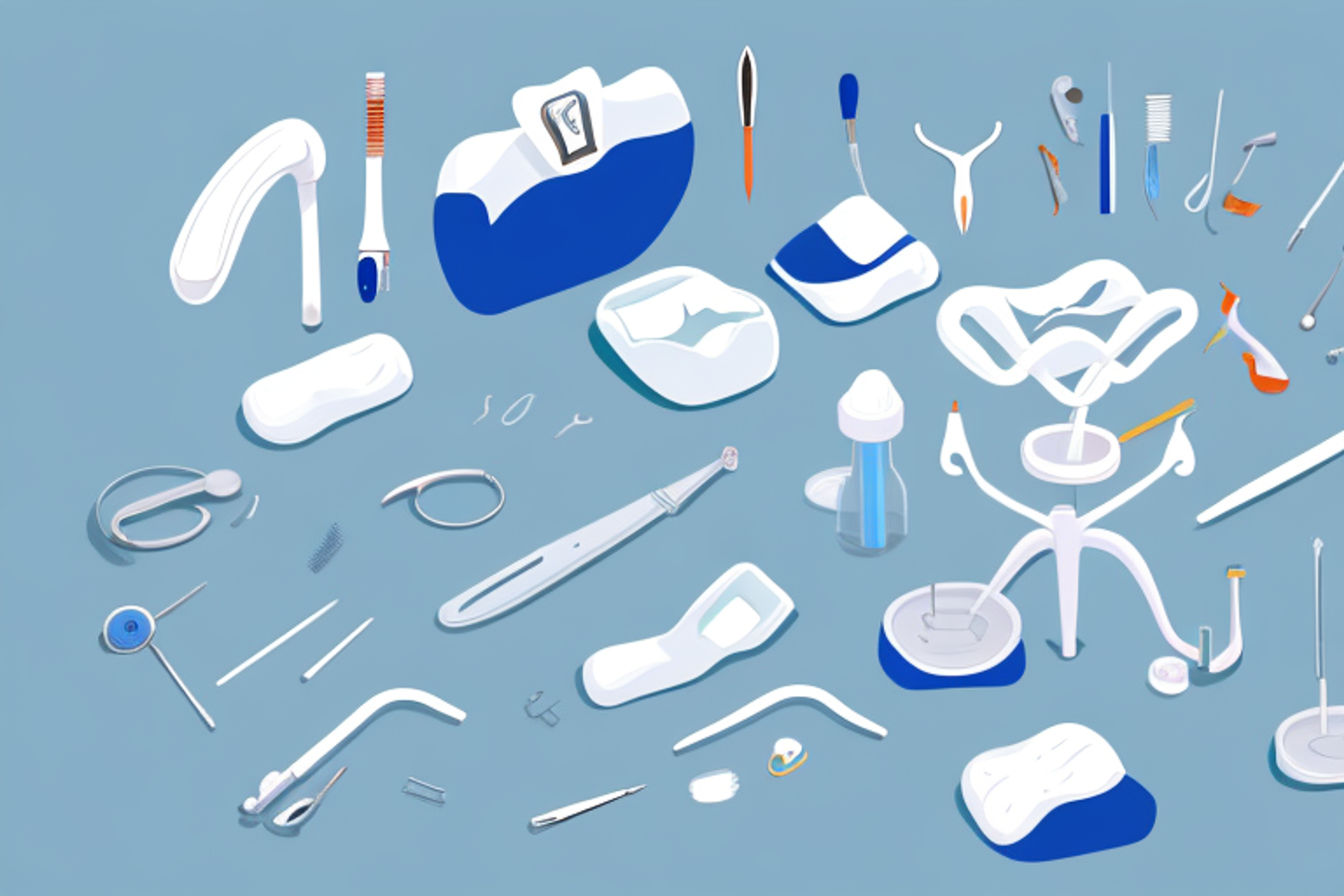Dentist Average Salary: How Much Do Dentists Make and What It Takes to Get There
Curious about the average salary of a dentist? Our article explores the earning potential of dentists and the education and experience required to reach that level.
Posted June 13, 2025

Join a free event
Learn from top coaches and industry experts in live, interactive sessions you can join for free.
Table of Contents
The world of dentistry can be an exciting and rewarding career path for those who are passionate about oral health. But what kind of salary can you expect as a dentist? What factors influence your income, and what are the educational requirements to get started? In this article, we’ll explore the ins and outs of dentist salaries and what it takes to get there.
The Importance of Choosing a Career in Dentistry
The field of dentistry is more than just about preventing and managing oral diseases. It's a rewarding career that allows you to make a significant impact on the lives of others. Dentists help patients overcome anxiety and establish good oral health practices that last a lifetime. They also work to improve patients' appearances, self-confidence and overall quality of life.
Furthermore, dentistry is a constantly evolving field, with new technologies and techniques being developed all the time. This means that dentists have the opportunity to continually learn and grow in their profession, keeping their skills and knowledge up-to-date. Additionally, dentistry offers a variety of specializations, such as orthodontics, periodontics, and endodontics, allowing dentists to focus on areas that interest them the most.
Educational Requirements for Becoming a Dentist
To become a dentist, you must complete a Doctor of Dental Medicine or Doctor of Dental Surgery degree program accredited by the Commission on Dental Accreditation. These programs typically last four years and include both classroom and clinical instruction. Once you’ve graduated, you must pass the National Board Dental Examinations and a clinical licensing exam to secure a license to practice dentistry in your state.
Additionally, many dental schools require applicants to have completed a bachelor’s degree and have taken specific prerequisite courses, such as biology, chemistry, and physics. Some programs may also require applicants to have completed the Dental Admission Test (DAT) and have relevant work or volunteer experience in the field of dentistry.
Average Salary of a Dentist in the United States
According to the Bureau of Labor Statistics, the median salary for dentists in the United States as of May 2020 was $164,010. This is much higher than the median salary for all occupations, which was $41,950. However, the range of salaries for dentists can vary widely depending on factors such as location, specialization, and experience.
Location is a major factor that affects the salary of a dentist. For instance, dentists working in metropolitan areas tend to earn more than those working in rural areas. This is because the cost of living in cities is generally higher, and dentists in these areas have to charge more to cover their expenses. Additionally, dentists who work in states with higher average incomes tend to earn more than those in states with lower average incomes.
Specialization is another factor that can impact a dentist's salary. Dentists who specialize in areas such as orthodontics, periodontics, or oral surgery tend to earn more than general dentists. This is because these specialties require additional training and expertise, and the procedures they perform are often more complex and time-consuming.
Factors Affecting the Salary of a Dentist
Location is a significant factor in determining a dentist's salary. Urban areas, for example, tend to offer higher salaries than rural areas. Specialization can also lead to higher salaries, as dental specialties such as oral and maxillofacial surgery typically pay more than general dentistry. Experience is another critical factor in determining a dentist's earnings, as more experienced dentists will often command higher salaries.
Another factor that can affect a dentist's salary is the type of practice they work in. Dentists who work in private practices may have higher salaries than those who work in community health clinics or government agencies. This is because private practices often have more resources and can charge higher fees for their services.
Additionally, the demand for dental services can also impact a dentist's salary. Areas with a high demand for dental services may offer higher salaries to attract and retain qualified dentists. On the other hand, areas with a lower demand for dental services may have lower salaries due to less competition for jobs.
Job Outlook for Dentists in the Next Decade
The job outlook for dentists is positive, with the Bureau of Labor Statistics projecting a growth rate of 3% between 2019 and 2029. This rate is slower than the national average for all occupations, but it still means that there will be new job opportunities for dentists in the coming years.
One factor contributing to the slower growth rate for dentists is the increasing popularity of preventative dental care. As more people prioritize regular check-ups and cleanings, there may be less demand for complex dental procedures that require the expertise of a dentist. However, this trend also presents an opportunity for dentists to expand their services and offer more preventative care options.
Another trend that may impact the job outlook for dentists is the rise of tele-dentistry. With advancements in technology, it is now possible for dentists to diagnose and treat patients remotely. While this may not replace the need for in-person dental visits, it could lead to changes in the way dental practices are structured and staffed.
How to Prepare for Dental School and Pass Licensing Exams
If you’re interested in becoming a dentist, you should focus on developing a strong foundation in math and science in high school. You should also research dental programs carefully to find one that best suits your interests and goals. Once you’ve been accepted to a program, you should diligently work to maintain good grades and study for the National Board Dental Examinations and clinical licensing exam.
Aside from academic preparation, it’s also important to gain practical experience in the field of dentistry. Consider volunteering or shadowing a dentist to gain insight into the profession and to build your resume. Additionally, networking with professionals in the field can provide valuable connections and opportunities for mentorship.
It’s also important to prioritize self-care and stress management during the rigorous process of preparing for dental school and licensing exams. Make sure to take breaks, exercise regularly, and seek support from friends and family. Remember that taking care of your mental and physical health is crucial for success in any field.
The Role of Experience and Specialization in a Dentist's Salary
The more experience you gain as a dentist, the higher your salary is likely to become. But specialization is another way to increase your earning potential. Dental specialties such as orthodontics, endodontics, and periodontics can lead to higher salaries than general dentistry, although they often require additional education and training.
It's important to note that location can also play a significant role in a dentist's salary. Dentists practicing in urban areas or areas with a higher cost of living may earn more than those in rural areas. Additionally, dentists who own their own practice may have the potential to earn more than those who work for a larger organization or hospital.
Private Practice vs. Employment: Which Pays More?
A dentist can work in a variety of settings, including private practice, hospitals, and government agencies. Dentists who own their own private practice can potentially earn more than those who are salaried employees. However, owning a practice also comes with additional responsibilities, such as managing staff, marketing, and handling the business side of dentistry.
On the other hand, dentists who are employed by hospitals or government agencies may have more stable and predictable income, as well as benefits such as health insurance and retirement plans. They also do not have to worry about the administrative tasks that come with owning a private practice. However, they may have less control over their work schedule and treatment options, as they have to follow the policies and procedures of their employer.
Benefits and Perks of Being a Dentist That Can Increase Your Pay
Beyond salary, dentists often enjoy a variety of perks that can increase their overall compensation. For example, many employers offer benefits such as health insurance, retirement plans, malpractice insurance, and paid time off. Dentists may also have opportunities to earn additional income through consulting, speaking engagements, and continuing education courses.
Common Career Paths for Dentists and Their Earnings Potential
Beyond private practice, there are many other career paths that dentists can pursue. Some dentists work in academia, conducting research and teaching the next generation of dentists. Others work in public health, helping to prevent and manage oral diseases in underserved populations. Salaries for these paths can vary widely, but they often come with unique opportunities to make an impact.
How to Negotiate Your Salary as a Practicing Dentist
If you are a practicing dentist, negotiation skills can be critical when it comes to salary negotiations. It’s essential to research dentist salaries in your area and be prepared to make a strong case for your value as a professional. You should also be clear about your expectations regarding salary, benefits, and career advancement and be prepared to discuss these topics with your employer.
There you have it, a comprehensive guide to dentist salaries and what it takes to achieve them. Whether you’re just starting your dental journey or seeking a new opportunity, understanding these factors can help you achieve the highest possible compensation.
Browse hundreds of expert coaches
Leland coaches have helped thousands of people achieve their goals. A dedicated mentor can make all the difference.


















